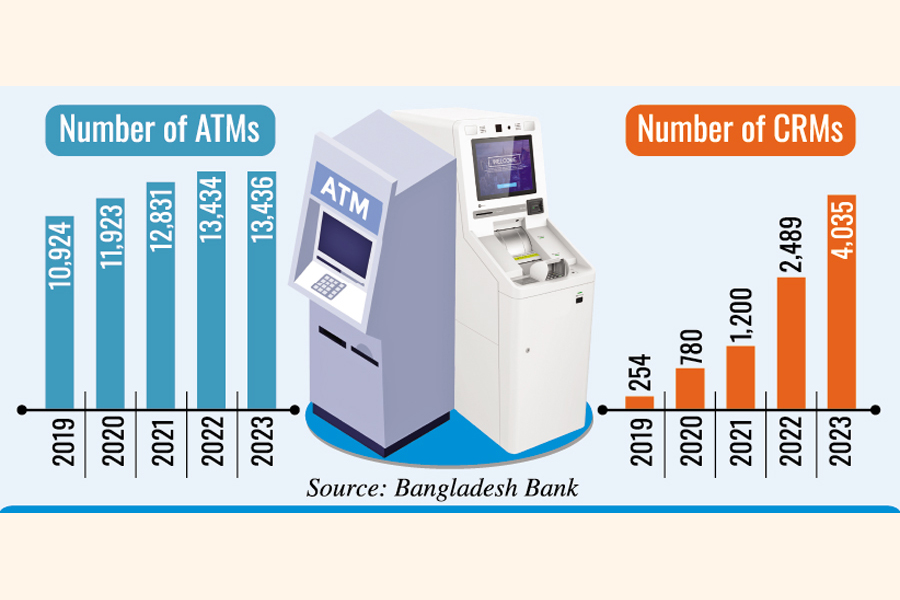Banking on cusp of CRM switchover
Cash recycling machine completes real-time deposit, withdrawal
Money deposited by someone instantly hits their balance

Published :
Updated :

Banking in Bangladesh is on the cusp of a fast switchover to cash recycling machine (CRM) technology that completes real-time deposit and cash withdrawal without clients having to visit bank offices.
Customers will no longer need to go to banks and stand in queues to withdraw or deposit money as they can do both easily and quickly at a booth, bankers say about the digital device meant for almost all banking solutions.
About seven years ago, CRM made a soft and silent landing in Bangladesh. However, in the last few years, all banks have gone for replacing automated teller machine (ATM) with CRM in strides towards complete digital- banking operations.
Bangladesh Bank statistics show the number of CRMs climbed fast in a year now, to 4,791 in April 2024 from 3,028 in the same month in 2023. The figure of ATMs climbed down to 13,507 in April 2024 from 13,614 in April 2023 in the transition process.
Dutch-Bangla Bank PLC, which claims one of the largest networks, now operates 4,577 ATMs and 3,198 CRMs. Three months back it had about 2,000 CRMs.
Banks like City and BRAC also prefer CRMs to ATMs. Currently, the number of the new device in City Bank PLC is 313 while ATMs 123.
Shafiul Amin, head of retail distribution of City Bank, says his bank started implementing CRM two to three years ago. They planned to phase out all ATMs and provide CRM at the booths within a few years.
"We will not install any new ATM, we will install CRM instead," Mr Amin told the FE correspondent about the cost-effective and hassle-free banking option.
And 100 more CRMs will be installed this year, he added.
As the use of this cash-recycling machine increases, its spinoffs are reflected in transactions.
The central bank data show the volume of transactions increased by Tk 133.35 billion through CRMs as of April 2024 from Tk 85.45 billion in April 2023.
On the other hand, the transaction amount declined to Tk 295.92 billion in April 2024 from Tk 345.0 billion in the same month in 2023 through ATMs.
The newcomer bears hold-all services, unlike its precursor, in tune with the fast-moving life and activity.
Shafiul Amin says CRM has almost all types of emergency services to customers. "Real-time transactions are done through this device, meaning when someone deposits money, it hits their balance instantly. As a result, it catches customer attention."
Besides, with this computing machine, customers get various services such as bKash customers can withdraw money too--and there are also payment options.
If these services are provided through branches, he recounts, banks must bear a significant cost.
"We had a survey in 2018 and 2019, which found that we spend a minimum of Tk 100 to 110 per day for each client who comes to the counter to receive money or other services.
"If we install CRM in every booth, we can save this cost," he says, adding that their cost already has been minimised following installation of the updated device.
The City Bank official also said every bank is installing CRM now instead of ATMs. He believes banks will switch almost entirely to CRM within two years or three.
"We are trying to make the clients accustomed to smart banking, as many people in Bangladesh still feel comfortable going to the branch to withdraw money."
He mentions that their maximum cash-withdrawal limit is now Tk 50,000 using CRM or ATM. There is a plan to uplift the limit to Tk 100,000 to Tk 150,000 shortly.
Once banks brought Cash Deposit Machine (CDM) for depositing money and it was kept in ATM booths. It used to take two to three days to deposit money through this device, as it does not show in the balance until banks record the transaction.
So, it did not become popular with customers. Currently, CDM is almost phased out. Some 220 CDMs were recorded in April this year, while 813 were in April 2023.
Like City Bank, BRAC Bank is also replacing its digital banking services with CRMs. "We also prefer CRM when buying new machines," says Imtiaz Ahmed, head of the alternative delivery channels of BRAC Bank.
He mentions that CRM does not need to load cash often as do ATMs. Because the money deposited by the clients is being recycled there. As a result, there is no need to load into the machines repeatedly.
Although the deposit is now one-third of that of withdrawing money by CRMs, the frequency of loading money has notably got reduced.
"There is the trouble of loading money into an ATM, and it also bears a cost."
Mr Imtiaz, however, says CRM cannot be provided there until the old ones expire, as there is a significant investment involved in an ATM. Now BRAC Bank has 330 ATMs and 55 CRMs.
"The use of CRM is increasing as customers prefer it. However, the demand for ATMs will not end completely soon, as withdrawals are more than deposits in many spots, especially in rural areas."
arafataradhaka@gmail.com


 For all latest news, follow The Financial Express Google News channel.
For all latest news, follow The Financial Express Google News channel.